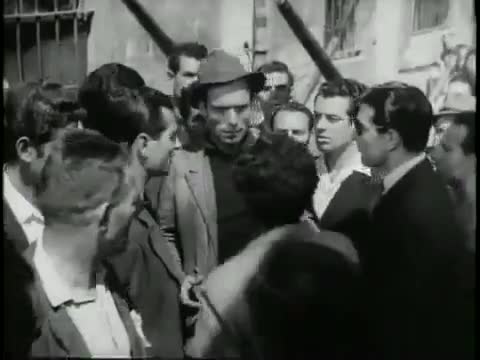Regie:
Vittorio De SicaKamera:
Carlo MontuoriMusik:
Alessandro CicogniniBesetzung:
Lamberto Maggiorani, Enzo Staiola, Lianella Carell, Gino Saltamerenda, Vittorio Antonucci, Giulio Chiari, Carlo Jachino, Emma Druetti, Nando Bruno (mehr)Streaming (3)
Inhalte(1)
Im Rom der Nachkriegszeit hofft ein Mann aus ärmsten Verhältnissen mit einer neuen Anstellung als Plakatkleber seine Familie ernähren zu können. Seine neue Stellung gerät in Gefahr, als ihm sein Fahrrad gestohlen wird, das er für diese Arbeit unbedingt braucht. Mit seinem kleinen Sohn macht er sich auf die Suche nach dem Dieb. In seiner einfachen Struktur und umwerfenden Weisheit, verkörpert „Fahrraddiebe" alle Stärken des italienischen Neorealismus: Emotionale Klarheit, soziale Gerechtigkeit und brutale Ehrlichkeit. De Sica zeigt an dem durch Rom wandernden Gespann das Alltagsleben und Elend der Nachkriegszeit und entwickelt darüber hinaus eine anrührende Geschichte über Liebe und Hoffnung zwischen Vater und Sohn. (Alamode Film)
(mehr)Kritiken (5)
For me, this is probably the strongest film of Italian neorealism and Vittorio De Sica. Its attractiveness and power lie in the naturalness that comes from the use of non-actors, knowledge of the filmed environment, and the difficult social reality of post-war Italy, which is struggling with a severe crisis, mass unemployment, and poverty. It is a film that is not burdened by artificial layers of commercial cinema, wherein emotions are conveyed alongside film images only through film music. It is a powerful film that is also emphasized by the black-and-white material. It is incredible how many unforgettable shots fit into just 90 minutes of footage. How many events can be fit into a single day of an ordinary municipal officer who is existentially dependent on his bicycle? The most interesting passages depict the existence of a large Roman lumpenproletariat. Overall impression: 95%. A classic film that is part of basic film education.
()
More than a cross-section of neorealist theory, The Bicycle Thieves struck me as a poignant symbolic statement about its bleak, depressing times. The theft of a bicycle and the subsequent search for it suffice as motives to fully understand the despair and misery of which it so subtly and stoically speaks. Pure cinematic language that doesn't need to exaggerate or rely on star filmmakers, just get out on the street, empathize with your characters and film, and the result will be disarming. 90%
()
A sad and depressing film. The beautiful and thorough scene structure and the amount of detail in the film convey the atmosphere of the time to the viewer (they say it's called neorealism -) ) and the ending is downright surprising.
()
Watching the helplessness, despair, and hopelessness of the main character, whose only desire is to work and provide for his family, is a heart-wrenching experience, as we see more and more bitterness and disappointment. The struggle for one's own dignity is even harder because it is not only happening in front of him but also through his son and in the presence of future generations. For a 21st-century viewer, the seemingly uniquely beautiful Rome of the 1940s hides rather a sense of hopelessness from which prayers or God himself cannot help, but so far neither can anything else...
()
The premise may seem ridiculous. A man gets a job and needs a bike for it. But the bike is stolen from him. Nowadays, people would just shrug it off, but what creates a beautiful and cruel image of Italy at the time is the fact that the film's hero does not shrug it off and cannot shrug it off either. He needs the bike because otherwise he will be a poor man without a job again. It is a human testimony about a world where there is not a place for everyone. At least not the kind of place they would wish and need. It is extremely terrifying that this is our world and not one so distant.
()

